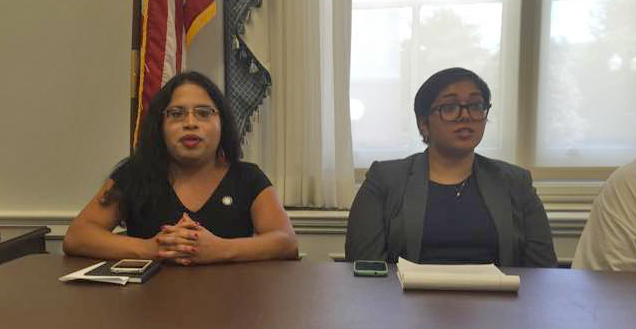NCTE Joins Immigration Advocates on Capitol Hill to Discuss Detention of LGBT Immigrants

Last Wednesday, the National Center for Transgender Equality (NCTE) participated on a panel to brief House of Representative staffers about transgender and LGB immigrants in detention. NCTE joined with colleagues from Center for American Progress, United We Dream, Immigration Equality, as well as Marichuy Gamino, a formerly detained transgender woman.
The panel discussed a new memo from the Immigration and Customs Enforcement agency (ICE) on the treatment of transgender people in detention, and outlined why the new measures are not enough. All panelists stressed that ICE has failed time and time again to keep LGBT detainees safe and therefore should not detain them.
Marichuy Gamino, who was detained at Eloy Detention Center, spoke about her experiences in a private, for-profit detention facility in Arizona. While held in the men’s facility she experienced sexual violence, and then was placed in solitary confinement. She eventually was able to get out on bond, but most detainees are unable to pay high bonds.
Last November, Secretary Jeh Johnson of the Department of Homeland issued a memo that discouraged the detention of vulnerable populations in ICE facilities but failed to mention the vulnerability of LGBT people. LGBT experience high rates of sexual assault and rape in jails and prisons, according to a report by the Department of Justice – as much as 9-10 higher for trans people as compared to overall abuse rates. ICE’s recent guidance is an admission of this problem and the extreme vulnerability of detainees who are transgender. This is not the first time ICE has purported to protect trans people with new policies, and even if fully enforced the most recent measures are insufficient to protect highly vulnerable immigrants within a dangerous and unnecessary system.
Many LGBT immigrants flee to the United States looking for safety and have a strong case for asylum. It is in their favor to show up to their court dates and follow through all the processes to be granted asylum. Instead of supporting and caring for this vulnerable and victimized population , we are locking them up and exposing them to more danger” said Raffi Freedman-Gurspan, Policy Advisor at NCTE.

